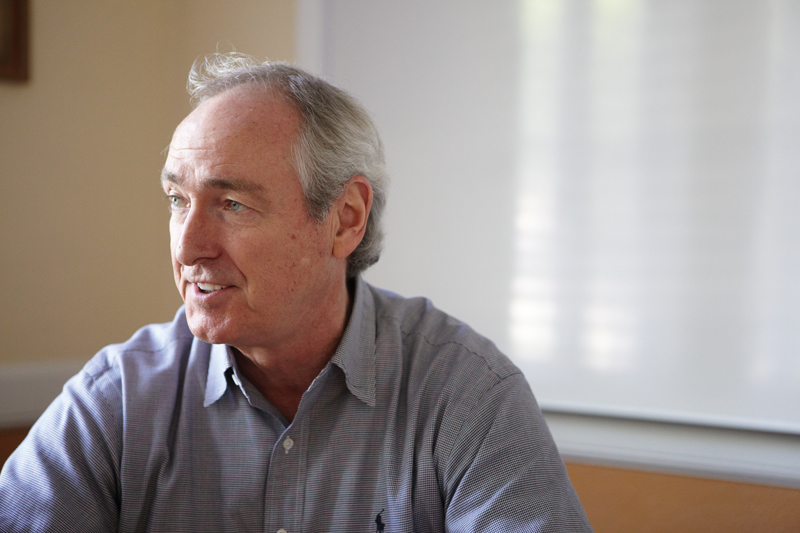
Philip Deaver came from a small town. When he left, he took it with him, as good writers often do.
He grew up in the 1950s and ’60s in Tuscola, Illinois, population 3,000. His mother had been a Navy nurse whose patients included Pearl Harbor survivors. His father, the town’s multitasking doctor, had delivered many of Phil’s classmates, then continued to treat them into adulthood. Occasionally, Phil would meet farmers who, having run afoul of their machinery, bore the spidery tracks of his father’s surgical handiwork.
Phil was 18 when he came home one day and knew from the look on his younger sister’s face that something terrible had happened. He guessed, correctly, that his grandfather had died. But so, too, had his father, both men killed when a careless driver plowed into their car at an unmarked country intersection.
Some people will tell you the town never really got over it. Others say neither did Phil.
He’d always been fascinated with writing, and, after a few years as a businessman, began building a career crafting sinewy poems and earthy short stories inspired by the people and places of his Southern Illinois childhood.
My favorite story of his is called “Arcola Girls” — Arcola being a real-life town near Tuscola, and the girls being more intriguing than those back home, at least in the eyes of the story’s young narrator, who lands a tenuous first date that involves recruiting a mobile-home clairvoyant to oversee a woodland séance.
That tale, redolent of the fitful mysteries of small-town adolescence, won the annual O. Henry Award in 1986. Silent Retreats, the collection in which the story appeared, won the Flannery O’Connor Award for Short Fiction.
Partly on the strength of those awards, Rollins hired Phil to teach fiction writing in its English Department. I say partly because in Phil, authenticity overshadowed acclaim. He took himself lightly and his trade seriously.
He was a selfless champion of great writing, worshipping bestselling writers of his generation such as Ann Beattie — an admiration she returned — while equally and wholeheartedly celebrating his students’ successes.
Over the years, he would marry a Rollins adjunct professor, Susan Lilley, now poet laureate of the City of Orlando and a teacher at Trinity Preparatory School. They became a literary power couple, attracting a community of Central Florida writers into their orbit.
Then, just as he was on the brink of publishing an ambitious book of interlocking short stories, Phil began to change.
He’d always been a faithful correspondent. Now friends and family stopped hearing from him. He’d always been enthusiastic and outgoing with colleagues and students. Now there was a certain vacancy in his greeting. And his classes, once inspiring, became listless and disorganized.
Finally came a diagnosis: Phil suffered from a form of frontotemporal dementia — a fatal disease that disrupts the part of the brain that engenders language and social skills. It develops earlier in life and progresses much more rapidly than Alzheimer’s.
By the time he died on April 29 at the age of 71, Phil could no longer speak.
There were two mid-May memorial services. One was in Tuscola, where he was buried next to his parents. The other, at Knowles Memorial Chapel on the Rollins campus, was as unassumingly eloquent as the man it honored.
Retired Rollins English Professor Lezlie Laws, an advocate for Phil on the search committee that hired him, spoke of becoming so enthused upon reading his stories for the first time that she threw the book aside and, much to her husband’s amazement, started jumping up and down on the bed.
Poet Billy Collins, senior distinguished fellow at the college’s Winter Park Institute, read a poem Phil had written called “Flying.” It describes a recurring childhood dream of magically soaring over his home, looking down at his town and his family on a Midwestern summer’s day.
Phil’s son, Michael, a recruiting specialist with Orange County, described his father’s final days. He spoke of how he and his sister, Laura, a Rollins graduate with a degree in counseling, had sat on either side of their father’s bed, holding his hands, as the renowned wordsmith — wearing his favorite St. Louis Cardinals jersey — made a final, silent retreat.
A few days before, father and son had sat quietly, face to face in a hospice facility, simply looking into each other’s eyes. Michael had said “I love you.” Long moments later came a last, miraculous reply:
“I love you too, boy.”
Michael McLeod is a contributing writer for Winter Park Magazine and an adjunct instructor in the English department at Rollins College.

